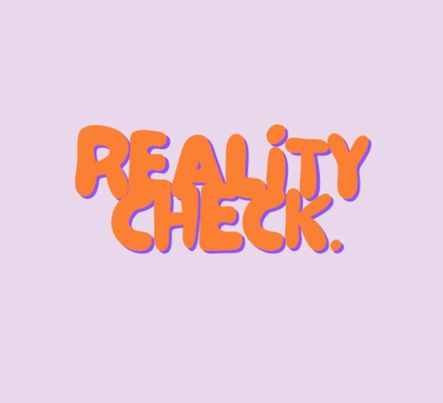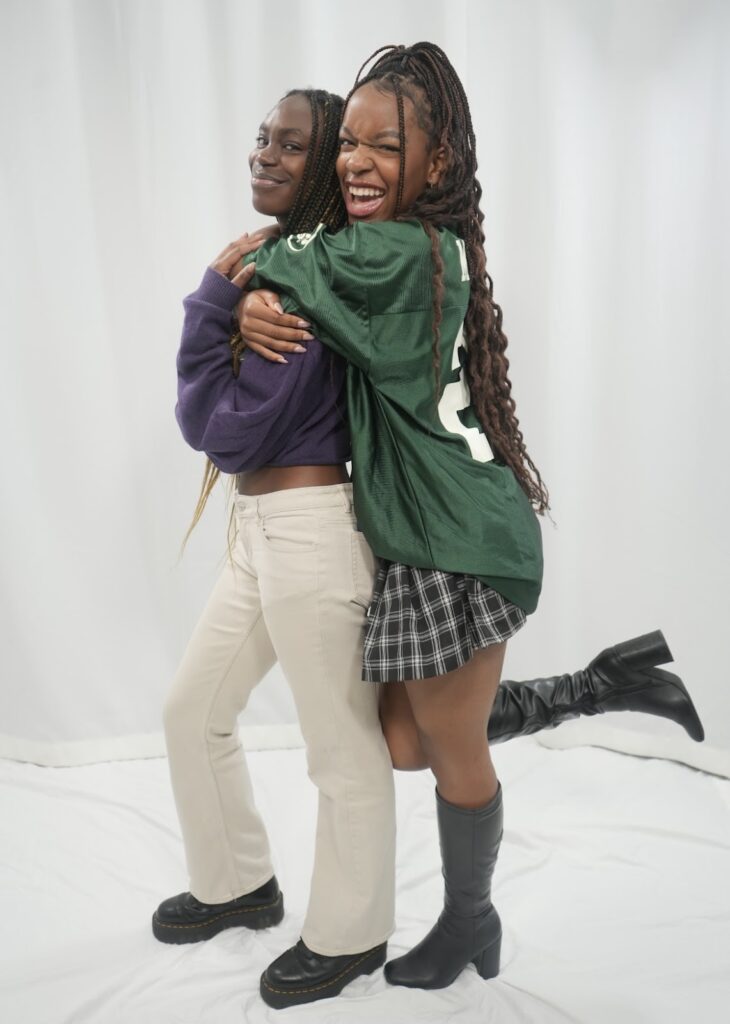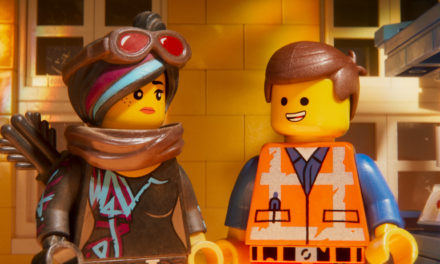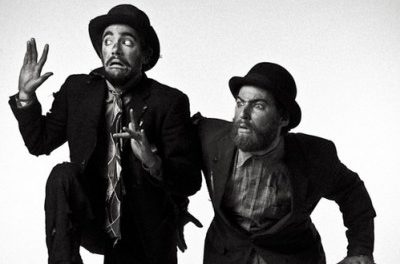
(Courtesy of Reality Check)
Approaching the release of the fourth episode of their web series “Reality Check,” co-creators Cyreema Marshall (25C) and Zikora Mbadugha (25B) joined The Emory Wheel for a discussion about all things independent filmmaking, from the professional to the personal.
“Reality Check,” which premiered on Youtube on Feb. 25, has amassed nearly 7,000 views across the first three episodes. The series follows two Black girls, Monet Okoye (Mbadugha) and Colby Jordan (Aziah Phillips-Allen), as they navigate their freshman year at a predominantly white institution. The drama-comedy’s content and characters live up to its irreverent slogan: “Let’s Normalize Chaos.”
Episode four of “Reality Check” was released on YouTube on Oct. 20, the first installment of season 1b. The episode, entitled “Sleepless in Atlanta,” follows Monet and Colby as they take on Atlanta nightlife to a degree that absolutely lives up to their show’s memorable tagline, with Monet and Colby getting more than a little chaotic. The fourth episode marks a comeback for the web series, resuming production after a brief pause during summer months.
As soon as we could all see and hear each other, Marshall immediately struck up a conversation, and Mbadugha began to apply a sparkling eye mask. I found myself with a smile on my face just as big as the ones on both of theirs. Marshall and Mbadugha seemed to be masters of the art of chic professionalism, and I quickly understood why everyone always seemed to be having so much fun in their behind-the-scenes sneak peeks.
While co-showrunners is their official title, the two creators wear many hats. Mbadugha is the co-producer, director, co-writer and star of various episodes, sometimes all at once. Marshall is the series’ co-producer, co-writer and editor. The pair has been working creatively together since they arrived at college and lived next to each other in Turman Hall.
“[Marshall] would always help me with my self-tapes and help me set up, and then she was a writer, so I’d also read her scripts,” Mbadugha said. “It was just a lot of bouncing off ideas.”
After their “chaotic” first year of college, the creators wanted to make something that would exercise their creative muscles and reflect their experiences in their first years of college.
“‘Reality Check’ has both been a catharsis in the way that we’re coming to terms with growing up as well as just something fun that we’ve been able to include a lot of our friends in,” Marshall said.
The pair debated what kind of media they wanted to utilize to capitalize on their creative vision but ultimately settled on a web series because of its potential for exploration and room for continuity.
“The characters are so dynamic and have so much depth that just having a short film wouldn’t have been able to capture all that,” Marshall said. “The format allows us the wiggle room to get to know our characters and have the Emory University community get to know these characters.”
Marshall and Mbadugha cited creators Issa Rae, who also began her career co-starring and co-writing her own web series “The Mis-Adventures of Awkward Black Girl,” and Brian Jordan Alvarez, who also launched his career with a web comedy series in 2016, as inspirations. They also centered the importance of their families and a serendipitous encounter with Abbi Jacobson, the co-creator and co-star of TV sitcom “Broad City.”
“When I was in [Los Angeles] this summer, we were writing ‘Reality Check,’ and we were having the most difficult time writing this fourth episode,” Mbadugha said. “And then I look up at a coffee shop, and I see the creator of ‘Broad City’ sitting right across from me … That was the biggest sign.”
Mbadugha and Marshall credited Emory’s “student communities” for supporting the series through its growth and sustaining its momentum. Whether it be the privilege of accessing equipment through the University’s various film organizations or the willingness of film students and faculty to help them with production, some pockets exist within the University to help give filmmakers a platform.
Mbadugha also referenced professors who helped “Reality Check” happen, including Avery Williams and Dehanza Rogers.
“[Williams and Rogers] understand that the [film] community is so small at Emory, so they want to support the students that are here,” Mbadugha said.
Additionally, Mbadugha said that she and Marshall like to maintain a friendly atmosphere on set. She said that the dynamic duo has found the balance between “being serious and getting stuff done” and “remembering to have fun.”
“The cool thing is that we are friends with everyone on our crew, our cast,” Mbadugha said. “And then everyone, literally everyone on our set, is funny, so we’re just constantly laughing all the time.”
She also recalled a moment when the crew was attempting to wrap up a late-night shoot near campus but kept getting interrupted by the sound of trucks driving on the road behind them. There was more frustration than humor in the situation, but Mbadugha said that everyone was laughing regardless.
“That’s the kind of community delusion that I love,” Mbadugha said. “Our set is so delusional, and I love it.”
As they’ve released more episodes, Mbadugha and Marshall have expanded their production’s reach from Emory’s campus into the wider Atlanta film industry. They said they find joy in the atmosphere of Atlanta filmmakers and hope to help “bridge” the gap between “the Emory bubble” and the city of Atlanta.
“What’s so cool about Atlanta is that people are super passionate about what they’re doing but [also] super genuine,” Mbadugha said. “You don’t get that a lot in an industry like this — people genuinely want to help people.”

(Courtesy of India Valdivia, 25C)
Although each character in “Reality Check” is distinctly their own, Marshall and Mbadugha explained how their identities and the main characters intertwine.
“Monet is what I could have been like in another life,” Mbadugha said. “We both grew up in predominantly white areas, and that affected our psyche and how we see the world. But I think I was more immersed in Black culture from an earlier age, so I never really questioned my identity.”
Mbadugha elaborated on how her and Monet’s character embody both similarities and differences in their experiences of inhabiting their identities and exploring their newfound college communities.
“I was always proud to be a Black woman,” Mbadugha said. “[But] college for Monet is this ground to explore her identity, what it means to be Black, what it means to be around Black people.”
Marshall said she found kinship with the character of Colby.
“She just wants to be liked; she wants to be popular,” Marshall said. “And that’s how I am. I have so many aspirations and ambitions, but at my core, I’m a shy girl.”
Mbadugha said “Reality Check” contains “something for everyone” while also putting a unique lens on Black girlhood. For the pair, it is all about switching up the narrative in popular media and giving more dimensionality to the story of Black women.
“Black girlhood is so diverse and exciting and transformative,” Mbadugha said. “The current media’s landscape is getting better at reflecting that, but I still think there’s so many stories that haven’t been [explored] … There’s not one way to be a Black woman in [the United States], so we hope to show that to people.”
Although Marshall and Mbadugha said they are constantly learning new things about the creative process and how to engage with it as they go, they offered advice to young filmmakers.
“As a creative, most of the time, you’re very protective of your ideas and what you bring to the table because it is a piece of yourself,” Marshall said. “But something that works, especially in our writer’s room, is we’re all open to ideas; we don’t take offense.”
“You honestly just have to have a vision that is so strong that no one can dissuade you from it,” Mbadugha added. “If you believe in your vision 100%, nothing will ever stop that.”
Nathan Rubin is a Junior from the Carolinas double majoring in Film & Media Studies and English. Outside of being Arts & Entertainment Editor at the Wheel, Nathan is a Writing Editor for Alloy Literary Magazine and hosts a queer radio show on WMRE. When he's not staring blankly at a blinking cursor, you can find him watching way too many horror movies and drinking way too many Baja Blasts.






